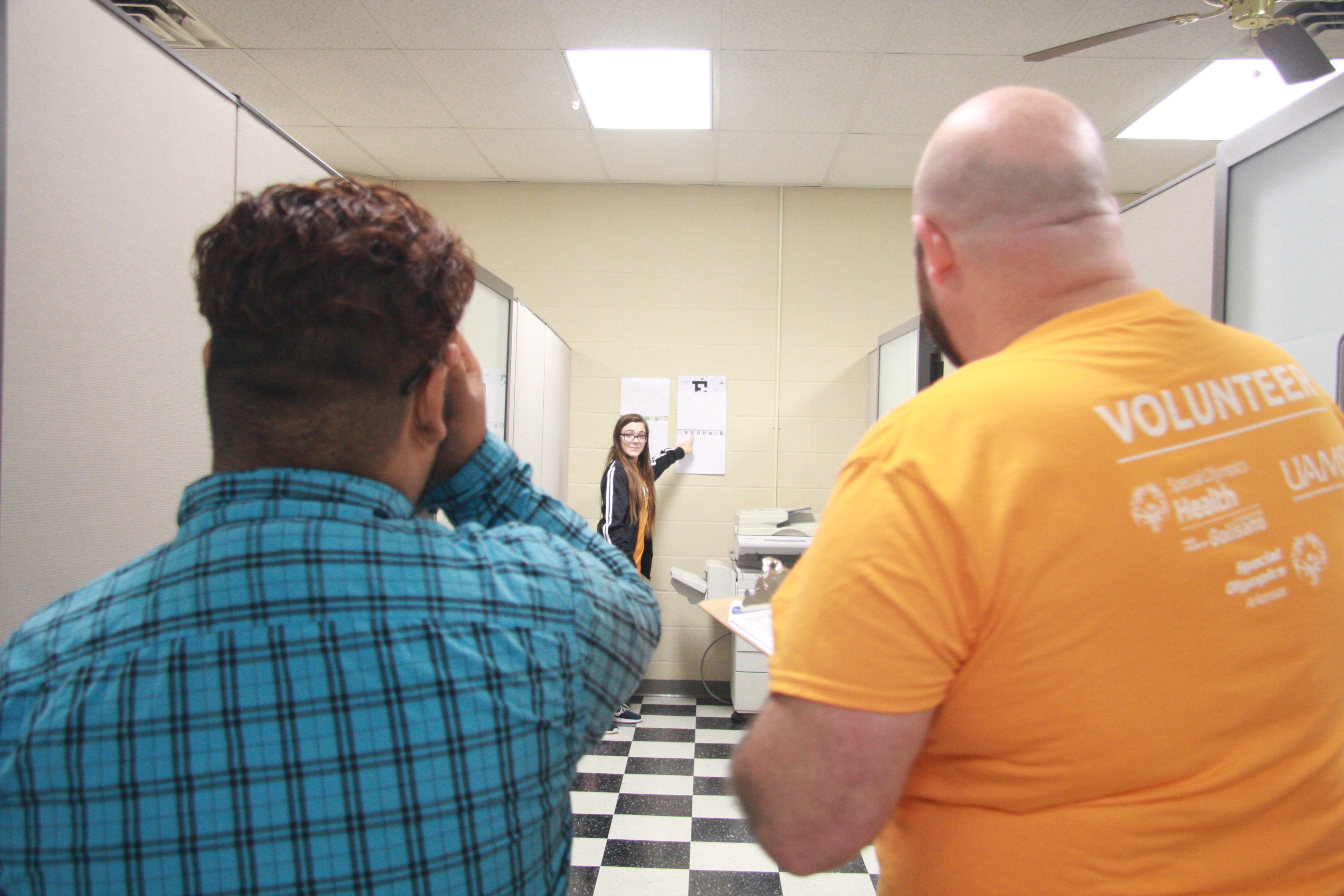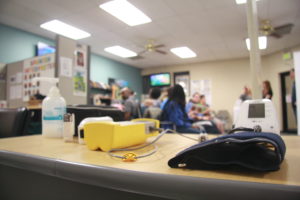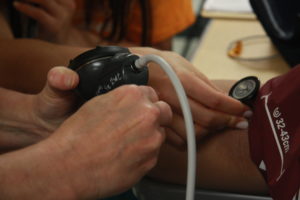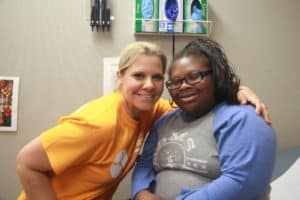View Larger Image

UAMS volunteers administer a vision screening for a Special Olympics athlete.
UAMS Volunteers Provide Physicals for Special Olympics Athletes
| Like a school gym on tryout day, the waiting room of the UAMS 12th Street Health & Wellness Center was abuzz with energy as dozens of young athletes waited their turn to take a physical that would clear them for sporting competition.
Some were a bundle of nerves. Others were relaxed and all smiles. But all of them had the same goal: to become Special Olympics athletes.
It was all part of Arkansas’s first ever MedFest, an initiative of Special Olympics of Arkansas and part of a collection of clinical programs called Healthy Athletes. MedFest provides required sports physicals to aspiring athletes at no cost and was recently launched in the state under the volunteer direction of UAMS College of Nursing faculty Leonie DeClerk, D.N.P., APRN, and Teresa Whited, D.N.P., APRN.
“It was a perfect opportunity for nurse practitioners to get involved, and we are happy to do it,” said Whited. “I’m a pediatric nurse practitioner and Leonie is a family nurse practitioner. So together we can care for patients across the lifespan continuum. Of course, as educators we are also always looking for opportunities for our students, and this gives them the chance to interact with and care for patients with special needs, some of whom may have multiple conditions or syndromes.”
Coordination of the patients receiving physicals was arranged by Special Olympics and included students from the Little Rock and Bryant school districts and the Arkansas School for the Deaf. DeClerk and Whited arranged for the use of the 12th Street Health & Wellness Center and recruited the faculty and student volunteers.
“Twelfth Street, with its clinic setting and private exam rooms, really was ideal,” said DeClerk. “A lot of sports physicals are done in gyms, but for students with special needs that can be overly stimulating.”
Each athlete received a “complete, basic head-to-toe physical,” which included vital signs and vision screening, examination of lymph nodes, head, eyes, ears, nose, and mouth, listening to heart and lungs, abdomen, musculoskeletal and neurological exam. DeClerk said special attention is paid to listening to the heart, requiring patients to be evaluated both sitting up and lying down.
“These student athletes are at risk for having cardiac disease related to their underlying health conditions, therefore they require a more thorough evaluation, but blessedly Teresa has a long experience in pediatric cardiology,” said DeClerk.
“We also have a lot of screening questions that look for anything that could indicate that there’s problem with spinal cord compression,” she added, “because the last thing you want is to have a student participating in a sport that they’re enjoying and then have some adverse outcome directly related to an underlying condition.”
All told, 30 young athletes received physicals. UAMS volunteers included 11 students and six faculty preceptors from the colleges of Nursing, Health Professions (physician assistant program) and Medicine.
“Our students really seemed to enjoy it,” Whited said, adding that the hope is to establish MedFest events at least quarterly and include locations not just in Little Rock but throughout the state.
“We can definitely collaborate with the regional campuses to try and meet the needs of Special Olympic athletes throughout Arkansas,” said DeClerk. “We’re hoping we’ll be able to tap into the available pool of students and eventually work with other health care professionals and educational programs to try and spread this.”
Both educators said the experience not only promoted service to the community, but service to their students, who need to be exposed to a variety of experiences.
“I have always worked with children with special needs, having started my career in pediatric cardiology. So this population will always have a special place in my heart,” said Whited. “I really feel that exposure to patients with special needs during my education spurred my professional growth, so I want to make sure we share that experience with our students. I want them to have the ability to develop that same passion for these patients who so very much need our services and our care.”


